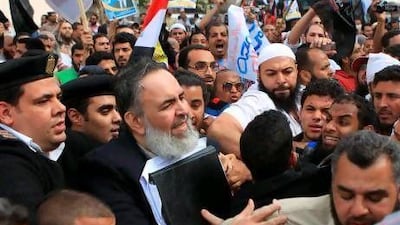CAIRO // The newly empowered Islamist political parties of Egypt were dealt a blow yesterday when a court suspended a 100-member committee charged with writing a new constitution while a panel reviews the legality of its formation.
The Muslim Brotherhood's Freedom and Justice Party and the more hardline Al Nour Party had used their majority in the parliament to pack the constitutional committee with many of their own members.
Islamist MPs and like-minded appointees were given 60 seats, while the remaining 40 were handed to liberals and other groups. Coptic Christians, who make up about 10 per cent of the population, and women were given only a handful of seats.
The make-up was seen by a broad spectrum of critics as contrary to the spirit of the constitution-writing process because it allowed Islamists to have the final say on the most important document to come out of the uprising last year that forced Hosni Mubarak to resign as president. The new constitution will establish the powers of the branches of government, enshrine rights for Egyptians and determine whether the relationship between religion and the state.
The fear from liberals, secular groups and Copts was that the Islamist political groups would use their majority to push the country on a more religious path that could exclude sections of the population.
More than 20 members have withdrawn from the committee, including the powerful Sunni Islamic institution Al Azhar, the Coptic Orthodox Church of Egypt, the union for journalists - known as the Press Syndicate - professors and several liberal and secular members of parliament.
The verdict yesterday referred the case to a panel of judges, who will examine the legality of the way the members of the committee were chosen. The case was originally filed by a group of lawyers and activists who argued that the committee does not properly reflect the diversity of Egypt's population.
A key part of that investigation will focus on the parliament's decision to appoint 50 members of parliament and 50 outside representatives to the committee. A constitutional declaration issued after Hosni Mubarak resigned as president last year did not specify how the committee would be chosen.
Mona Makram-Ebeid, a former member of parliament who withdrew from the constitutional committee because she felt Islamists had an unfairly large representation, said the court's decision was a "historic move".
"This proves once more that one of the main actors in the post-Mubarak age is the power of the streets," she said, describing how the court was responding to discontent from the population over the committee. "Popular pressure brought down the constituent assembly."
Ms Makram-Ebeid, who is also a member of the advisory council to the Supreme Counwil of the Armed Forces - the ruling generals - said she would only return to the committee if more of Egypt's well-known constitutional law professors were included and if the committee began its work in the spirit of the Al Azhar Bill of Rights proposed in January that would guarantee freedoms of worship, opinion, scientific research and art and creative expression.
The court's decision to suspend the committee is the latest political challenge to face the new Islamist political powers in Egypt, especially the Muslim Brotherhood and its political arm, the Freedom and Justice Party.
The group is facing pressure from outside and from within its own ranks as it seeks to solidify its control over the country more than a year after Mubarak resigned amid an uprising.
The decision last week to field Khairat Al Shater, the Muslim Brotherhood's deputy leader, as a presidential candidate despite a previous decision not to run a candidate has only exacerbated the splits within the group, analysts say.
"It's not going very well with a lot of their rank and file members," said Mohammed Zahid, an independent researcher in Cairo who is studying Islamist political movements. "The problem is the group is very structured in terms of providing services to the community, but when it comes to ideologies they are very fragmented."
The competition within the group is between its hunger to prove itself as the political solution to Egypt's decades of stagnation and its more spiritual origins that focused on interacting with Egyptians inside the communities, he said.
"The problem is that the more ambitious they get, the more problems they are facing within the movement," Mr Zahid said.
For his part, Mr Al Shater, the presidential candidate of the Muslim Brotherhood, said he "respected" the decision of the court to suspend the constitutional committee and yesterday called on political forces to find a solution to the "crisis".
"Egypt needs to establish a constitution for a modern, democratic state and pave the way to the country's renaissance," he said on his Twitter feed.
Follow
The National
on
& Bradley Hope on

